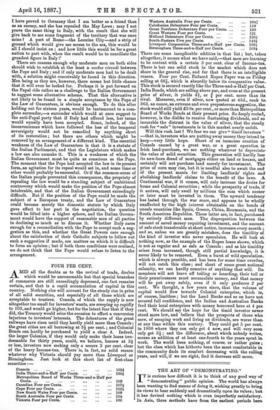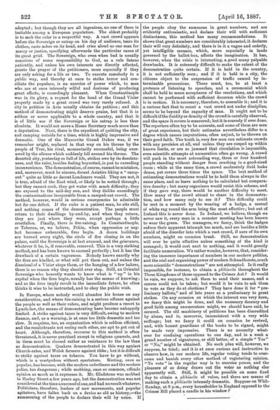THE ART OF "DEMONSTRATING."
IT is curious how difficult it is to think of any good way of "demonstrating" public opinion. The world has always been wanting to find means of doing it, wishing greatly to bring its views to bear suddenly and dramatically upon its rulers ; but it has devised nothing which is even imperfectly satisfactory. In Asia, three methods have from the earliest periods been adopted ; but though they are all ingenious, no one of them is imitable among a European population. The oldest probably is to mob the ruler in a respectful way. A vast crowd appears before the Sovereign or satrap on his day of audience, tears its clothes, casts ashes on its head, and cries aloud as one man for mercy or justice, specifying afterwards the particular cause of its great grief. The Sovereign, who even when bad is usually conscious of some responsibility to God, as a rale listens patiently, and unless his own interests are directly affected, grants the prayer of the petitioners, more especially if they are only asking for a life or two. To execute somebody in a public way, and thereby at once to strike terror and con- ciliate the populace, is an exercise of power which, to men who are at once intensely wilful and desirous of producing great effects, is exceedingly pleasant. When Constantinople was in its glory, a request for the head of the Grand Vizier properly made by a great crowd was very rarely refused. A city in petition in Asia usually obtains its petition ; and this method of demonstrating niight deserve praise, but that it is seldom or never applicable to a whole country, and that it is of little use if the Sovereign or his satrap is less than absolute. It would not move a Home Secretary much more than a deputation. Next, there is the expedient of quitting the city, and camping outside for a time, which is highly impressive and dramatic. One of the Muscovite Grand Dukes was, if we remember aright, replaced in that way on his throne by the people of Tver, his rival, momentarily successful, being over- awed by the silence which suddenly fell around his throne. The deserted city, yesterday so full of life, strikes awe by its desolate- nese, and the ruler, besides feeling boycotted, is pat to exceeding inconvenience. The demonstration, of coarse, cannot be mistaken, and, moreover, must be sincere, decent Asiatics liking a " camp- out" quite as little as decent Londoners would. They are not, it is true, afraid of the East wind, or likely to be wetted through ; but they cannot cook, they get water with much difficulty, they are exposed to the mid-day sun, and they dislike exceedingly the contaminations inseparable from a camped-out crowd. The method, however, would in serious emergencies be admirable but for one defect. If the ruler is a patient man, he sits still, and nothing comes of the demonstration. The people must return to their dwellings by-and-by, and when they return, they are jest where they were, except perhaps a little crestfallen. Finally, there is fire-raising. In Constantinople, or Teheran, or, we believe, Peldn, when oppression or neg- lect becomes unbearable, fires begin. A dozen buildings are burned every night, the circle of fire closing in on the palace, until the Sovereign is at last aroused, and the grievance, whatever it be, is, if removable, removed. This is a very striking method, and has been known to succeed perfectly ; but it has the drawback of a certain vagueness. Nobody knows exactly why the fires are kindled, or what will put them out, and unless the dismissal of a Vizier stops them, or the hanging of a few bakers, there is no reason why they should ever stop. Still, an Oriental Sovereign who honestly wants to know what is " up " in his capital when the fires begin, usually has the means of knowing ; and as the fires imply revolt in the immediate future, he often thinks it wise to be instructed, and to obey the public wish.
In Europe, where nobody would abandon his house on any consideration, and where fire-raising is a- serious offence against the people as well as their rulers, and might produce a resort to Lynch-law, the means of demonstrating have become unhappily limited. A strike against taxes is very difficult, owing to modern finance, and, as a warning, is at once too little dramatic and too slow. It requires, too, an organisation. which is seldom efficient, and the recalcitrants not seeing each other, are apt to get out of heart. Although, therefore, recourse to this method is often threatened, it is never practised except in religions quarrels, and in them must be classed rather as resistance to the law than as demonstration. Quakers demonstrated in this way against Church-rates, and Welsh farmers against tithe ; but it is difficult to strike against taxes on tobacco. You have to go without, which is a martyrdom without spectators. Rioting, once so popular, has become, with the modern orderliness and the modern police, too dangerous ; while mobbing, once so common, offends opinion as much as it expresses it. Mr. Gladstone was mobbed in Harley Street a few years ago, but the demonstration was not considered at the time a successf ul one, and had no result whatever. Politicians, therefore, leaders of new movements, and popular agitators, have fallen back on a device as old as history,—the summoning of the people to declare their will by noise. If
the people obey the summons in great numbers, and are evidently enthusiastic, and declare their will with sufficient distinctness, this method has many recommendations. It shows that great numbers are considerably interested, it declares their will very definitely, and there is in it a vague and orderly, yet intelligible menace, whioh, more especially in lands governed by the ballot-box, affects the imagination. It has, however, when the crisis is interesting, a good many palpable drawbacks. It is extremely difficult to make the extent of the demonstration quite certain. If it is held in the country, it is not sufficiently seen ; and if it is held in a city, the citizens object to the suspension of traffic caused by in- terminable processions. There must, too, be at least a pretence of listening to speeches, and a ceremonial which shall be held to mean acceptance of the resolutions, and which cannot be performed with sufficient decorum while the crowd is in motion. It is necessary, therefore, to assemble it; and it is a curious fact that to count a vast crowd not under discipline, seems to be beyond the capacity of man. It ought not to be difficult if the fluidity or density of the crowd is carefully observed, and the space it covers is measured; but it is scarcely if ever done. The reporters often try to be accurate, and some of them are men of great experience, but their estimates nevertheless differ to a degree which causes imputations, often unjust, to be thrown on their good faith. The truth is, very few men can estimate crowds with any precision at all, and unless they are cooped up within known limits, or are so jammed that circulation is impossible, even scientific attempts at numeration often go wrong. A crowd will pack in the most astounding way, three or four hundred people standing without danger from crushing in a good-sized room ; while at the same time, a crowd moderately fluid looks dense, yet covers three times the space. The best method of estimating demonstrations would be to hold them always in the same place, and so leave nothing to be calculated but compara- tive density ; but many organisers would resist this scheme, and if they gave way, there would be another difficulty to meet. How many of the crowd attend to share in the demonstra- tion, and how many only to see it ? This difficulty could be met in a moment by the wearing of a badge, a morsel of white rag round the arm being the most effective ; but out of Ireland this is never done. In Ireland, we believe, though we never saw it, every man in a monster meeting has been known to wear the green. The managers, we fancy, think the badges reduce their apparent triumph too much, and are besides a little afraid of the disorder into which a vast crowd, if sure of its own numbers, might on occasion break. Still, no demonstration will ever be quite effective unless something of the kind is arranged ; it would cost next to nothing, and it would greatly facilitate numeration. We rather wonder, however, that, consider. ing the immense importance of numbers in our modern politics, and the zeal and organising power of modern Schnadhorsts,much more scientific " demonstrations " are not attempted. Is it really impossible, for instance, to obtain a plebiscite throughout the Three Kingdoms of those opposed to the Crimes Act ? It would be vain, we suppose, to ask them to send their names, and a census could not be taken ; but would it be vain to ask them to vote as they do at elections P They have done it for "pre- liminary ballots," and of late years as a preliminary to great strikes. On any occasion on which the interest was very keen, we fancy this might be done, and the necessary decency and good faith among enumerators might, we should have said, be secured. The old machinery of petitions has been discredited by abuse, and is, moreover, inconsistent with a very wide suffrage ; but we fancy it could on occasion be revived, and, with honest guardians of the books to be signed, might be made very impressive. There is no necessity what- ever for confining operations to one day, and in a week a grand number of signatures, or still better, of a simple " Yes" or "No," might be obtained. No such plan will, however, we suppose, be tried ; and it is at once curious and instructive to observe how, in our modern life, regular voting tends to over- come and banish every other method of registering opinion. "To vote " in the regular way is to exercise power, and the pleasure of so doing draws out the voter as nothing else apparently will. Still, it might be possible on some fixed day to obtain a p/ibiscite of value, and there are means of making such a plebiscite intensely dramatic. Suppose on Whit- Sunday, at 8 p.m., every householder in England opposed to the Crimes Bill placed a candle in his window P



































 Previous page
Previous page